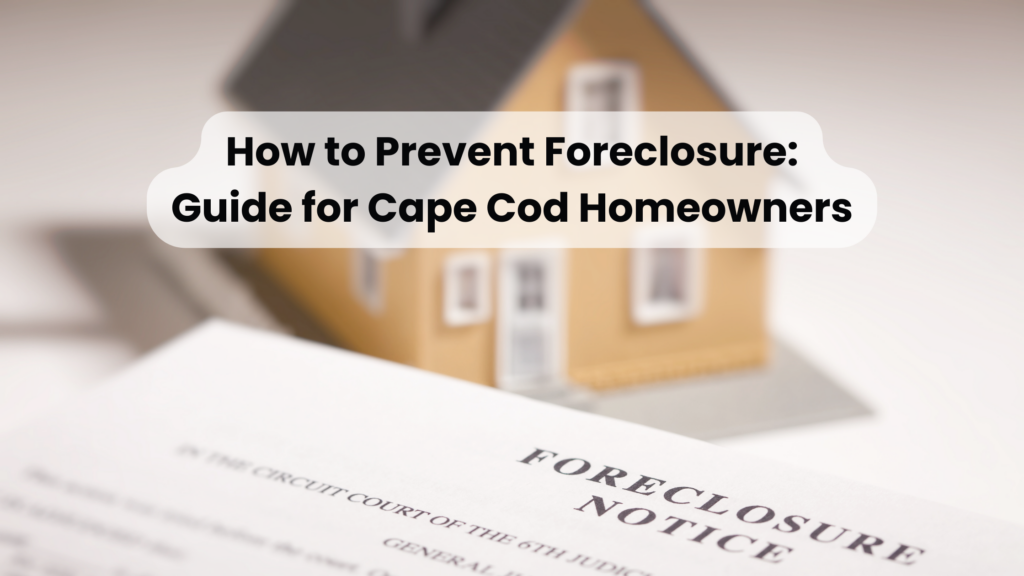
Disclaimer
The information provided in this article is for informational purposes only and should not be considered as legal advice. For specific guidance tailored to your situation, consult with a qualified attorney or financial advisor.
Owning a home is a significant milestone, but it also comes with its share of responsibilities. One of the most daunting challenges homeowners can face is the risk of foreclosure. If you’re navigating the Cape Cod real estate market and find yourself struggling with mortgage payments, this guide is for you. Here, we’ll explore actionable steps to prevent foreclosure and protect your investment.
Act Early If You’re Struggling to Make Payments
The first step in preventing foreclosure is recognizing the problem early. If you’re having difficulty making your mortgage payments but haven’t fallen behind yet, contact your mortgage servicer. You don’t have to be in default to qualify for a loan modification. However, you’ll need to show that you’re at risk of imminent default. Continuing to make payments is crucial, as defaulting will negatively impact your credit score and bring you closer to foreclosure.
Pro Tip: If you’re current on your mortgage in the Cape Cod real estate market, consider refinancing options to lower your interest rate and monthly payment.
Don’t Ignore the Problem If You’re Behind on Payments
If you’ve already missed mortgage payments, it’s essential to act immediately. Open all communications from your lender and be honest about your financial situation. The earlier you address the issue, the more options you’ll have to find a solution.
Expert Advice: If you’re based on Cape Cod and are behind on payments, feel free to contact me for assistance or referrals to specialized professionals who can help.
Consult Qualified Advisers
There are numerous free resources available that offer guidance on avoiding foreclosure. These services have trained advisers who can help with budgeting, discuss your options, and even speak with your servicer. Be cautious of fraudulent schemes that promise quick fixes for an upfront fee. Good places to start your research are at the U.S. Department of Housing and Urban Development (HUD) or Mass.Gov.
Know Your Legal Rights
Before a servicer can initiate foreclosure proceedings on your property, they are required to follow several steps. First, they must issue a default notice and provide you with a 90-day “right-to-cure” period. During this time, you have the opportunity to make up for any missed payments to your lender. If you’re unable to do so, this period also serves as a window for you to apply for a loan modification, a common practice in Cape Cod real estate to prevent foreclosure.
You might also receive a “Right to Request a Modified Mortgage Loan” notice, which is particularly relevant if you’re navigating the Cape Cod real estate market. Should you receive this, it’s crucial to read it thoroughly. Complete the accompanying “Notice of Election” form and send it back to the specified address by the given deadline. Even if you don’t receive this particular notice, you still have the option to apply for a loan modification directly with your servicer, a key step in safeguarding your Cape Cod property.
For those who are active-duty service members, there are additional protections through the Service Members’ Civil Relief Act (SCRA) of 2003. The SCRA covers not only active-duty service members but also reservists and National Guard members while they are on active duty. Under this act, mortgage lenders are prohibited from foreclosing on or seizing properties for payment delinquencies during active duty and for 90 days thereafter.
If you receive a notice regarding SCRA benefits and believe you or someone else qualifies for these protections, it’s essential to follow the instructions outlined in the notice.
Receiving an SCRA notice doesn’t necessarily mean foreclosure is imminent on your Cape Cod property. Even if the SCRA protections don’t apply to you, you should still reach out to your mortgage servicer to explore loan modification options. The issuance of an SCRA notice is just one step in the foreclosure process, and it’s not too late to seek foreclosure prevention measures. However, it’s crucial to act promptly to protect your investment in the Cape Cod real estate market.
Explore Your Options
Loan Modification
A loan modification is a long-term solution that changes the terms of your loan to make your monthly payments more affordable. This could involve lowering the interest rate, extending the loan term, or even reducing the principal amount. To apply for a loan modification, you’ll need to fill out an application with your mortgage servicer and provide documentation of your income, assets, and debts. This documentation might include tax returns, bank statements, a recent utility bill, and proof of income. The more organized you are, the sooner the mortgage servicer can provide an answer.
Forbearance or Repayment Plans
Forbearance allows you to pay less than your regular mortgage payment for a specific period. However, the unpaid amounts will usually be due at the end of the forbearance period. Repayment plans let you pay an increased amount for a short period to catch up on missed payments without changing the loan terms.
Short Sale or Deed-in-Lieu
In a short sale, the lender allows you to sell the property for less than what you owe. A deed-in-lieu of foreclosure means the lender agrees to take back the property without going through the foreclosure process. Both options can have tax consequences and may result in you still owing money to the lender.
Sell the Property Outright
Another option is to sell the property outright, not as a short sale. This allows you to use the proceeds to pay off your mortgage, avoiding foreclosure and potentially even making a profit depending on your home’s value and current conditions in the Cape Cod real estate market.
Bankruptcy
Bankruptcy is a complex legal process that can halt foreclosure but comes with its own set of challenges and long-term consequences for your credit.
Conclusion
Preventing foreclosure is possible with early intervention, open communication with your lender, and a clear understanding of your options. If you’re dealing with challenges related to Cape Cod real estate, don’t hesitate to reach out for professional guidance. Remember, the sooner you act, the more options you’ll have to protect your home and financial future.
For more information or assistance, feel free to contact us. We can also provide referrals to other specialized professionals to help you navigate this challenging time.

